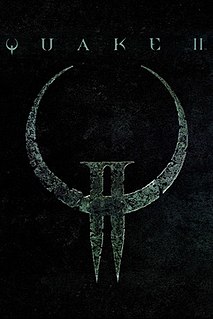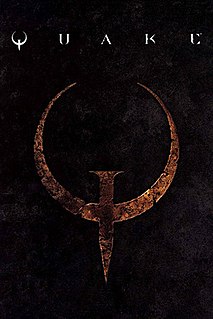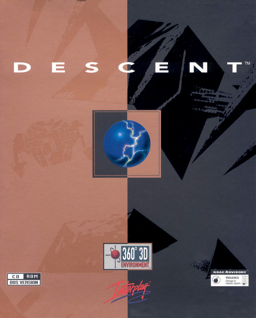
Quake III Arena is a 1999 multiplayer-focused first-person shooter developed by id Software. The third installment of the Quake series, Arena differs from previous games by excluding a story-based single-player mode and focusing primarily on multiplayer gameplay. The single-player mode is played against computer-controlled bots. It features music composed by Sonic Mayhem and Front Line Assembly founder Bill Leeb.

Quake II is a 1997 first-person shooter video game developed by id Software and published by Activision. It is the second installment of the Quake series, but not a direct sequel to Quake. The game's storyline is continued in its expansions and Quake 4.

Quake is a first-person shooter game developed by id Software and published by GT Interactive. The first game in the Quake series, it was originally released for MS-DOS, Microsoft Windows and Linux in 1996, followed by Mac OS and Sega Saturn in 1997 and Nintendo 64 in 1998. In the game, players must find their way through various maze-like, medieval environments while battling monsters using an array of weaponry. The overall atmosphere is dark and gritty, with many stone textures and a rusty, capitalized font. Quake takes heavy inspiration from gothic fiction and the works of H. P. Lovecraft.
Shareware is a type of proprietary software which is initially shared by the owner for trial use at little or no cost with usually limited functionality or incomplete documentation but which can be upgraded upon payment. Shareware is often offered as a download from a website or on a compact disc included with a magazine. Shareware differs from freeware, which is fully-featured software distributed at no cost to the user but without source code being made available; and free and open-source software, in which the source code is freely available for anyone to inspect and alter.

Descent is a first-person shooter (FPS) game developed by Parallax Software and released by Interplay Productions in 1995 for MS-DOS, and later for Macintosh, PlayStation, and RISC OS. It popularized a subgenre of FPS games employing six degrees of freedom and was the first FPS to feature entirely true-3D graphics. The player is cast as a mercenary hired to eliminate the threat of a mysterious extraterrestrial computer virus infecting off-world mining robots. In a series of mines throughout the Solar System, the protagonist pilots a spaceship and must locate and destroy the mine's power reactor and escape being caught in the mine's self-destruction, defeating opposing robots along the way. Players can play online and compete in either deathmatches or cooperate to take on the robots.

Doom II, also known as Doom II: Hell on Earth, is a first-person shooter game by id Software. It was released for MS-DOS computers in 1994 and Macintosh computers in 1995. Unlike the original Doom, which was initially only available through shareware and mail order, Doom II was sold in stores.
A source port is a software project based on the source code of a game engine that allows the game to be played on operating systems or computing platforms with which the game was not originally compatible.

GameSpy was an American provider of online multiplayer and matchmaking middleware for video games founded in 1996 by Mark Surfas. After the release of a multiplayer server browser for the game, QSpy, Surfas licensed the software under the GameSpy brand to other video game publishers through a newly established company, GameSpy Industries, which also incorporated his Planet Network of video game news and information websites, and GameSpy.com.

Multi Theft Auto (MTA) is a multiplayer modification for the Microsoft Windows version of Rockstar North games Grand Theft Auto III, Grand Theft Auto: Vice City and Grand Theft Auto: San Andreas that adds online multiplayer functionality. For Grand Theft Auto: San Andreas, the mod also serves as a derivative engine to Rockstar's interpretation of RenderWare.

Tim Willits is the former studio director, co-owner, and level designer of id Software, the American video game developer company. As of August 2019, Willits is the chief creative officer at Saber Interactive. He became a Director of 3D Realms with Saber Interactive’s acquisition of the company.

The Dreamcast is a home video game console by Sega, the first one introduced in the sixth generation of video game consoles. With the release of the Dreamcast in 1998 amid the dot-com bubble and mounting losses from the failure of its predecessor, the Sega Saturn, Sega made a major gamble in attempting to take advantage of the growing public interest in the Internet by including online capabilities in the console as a selling point. As such, the Dreamcast was the first console to include a built-in modem for Internet support and online play. Sega would end up leaning heavily into the online capabilities to sell the Dreamcast as hype grew for Sony's then-upcoming competitor, the PlayStation 2, which also promised online gaming in addition to its DVD capabilities.

Roger Wilco is one of the first voice-over-IP client programs designed primarily for use with online multiplayer video games. Roger Wilco enabled online gamers to talk to one another through a computer headset or other audio input device instead of typing messages to each other. Within a year of the software's introduction, over 2 million online video gamers were using the application.
Kali is an IPX network emulator for DOS and Windows, enabling legacy multiplayer games to work over a modern TCP/IP network such as the Internet. Later versions of the software also functioned as a server browser for games that natively supported TCP/IP. Versions were also created for OS2 and Mac, but neither version was well polished. Today, Kali's network is still operational but development has largely ceased.
Chess Live, formerly called US Chess Live, was a subscription Internet chess server that opened on August 8, 2000, and closed on 29 May 2007 when it was bought by Internet Chess Club and merged with World Chess Network to form World Chess Live.

Mplayer, referred to as Mplayer.com by 1998, was a free online PC gaming service and community that operated from late 1996 until early 2001. The service at its peak was host to a community of more than 20 million visitors each month and offered more than 100 games. Some of the more popular titles available were action games like Quake, Command & Conquer, and Rogue Spear, as well as classic card and board for more casual gamers. Servers and matchmaking was provided through a proprietary client. Initially, the service was subscription-based, but by early 1997, they became the first major multiplayer community to offer games to be played online through their network for free. This was done by relying on advertisement-based revenues.

The Dial-up Wide-Area Network Game Operation, better known by the acronym DWANGO, was an early online gaming service based in the United States. Launched in 1994, it was originally known for its compatibility with Doom, for which it functioned as a matchmaking service for online multiplayer. The service also supported various other titles, including other id Software games such as Doom II and Heretic as well as titles from other companies like Duke Nukem 3D, Blood, and Shadow Warrior from 3D Realms.
Quake Live is a first-person arena shooter video game by id Software. It is an updated version of Quake III Arena that was originally designed as a free-to-play game launched via a web browser plug-in. On September 17, 2014, the game was re-launched as a standalone title on Steam.
In multiplayer video games, matchmaking is the process of connecting players together for online play sessions.












